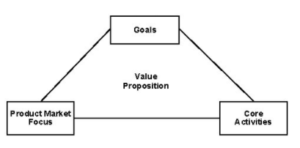Dear Consultant,
I work in a small engineering firm that designs and manufactures products that are brought to market by our clients. Even though many of these products sell to customers for a lot of money, we don’t get paid very much for the items that we produce for our clients. I recommended to my boss that we should start selling them ourselves. She told to come up with a business strategy to bring to her and the team. Where do I start? What parts should I include in a business strategy proposal?
What is business strategy is a broad and debated topic among practitioners and among academics. In your case though, it would be interesting to hear what your bosses motivations were for asking you for a business strategy rather than a business plan. Usually a business plan is more operational in nature, detailing the specifics of how you’d bring the products that you design and manufacture to market, specifying just how much money you’d make and itemizing the risks and contingency plans, etc.
By asking specifically for a business strategy I wonder if she is was trying to get you to think about what your company currently does in a way that is competitive in your industry, versus what you’re proposing in your suggestion above.
There are two useful tools that may help you to think about the strategy currently that you’re suggesting versus the strategy that your company is currently pursuing. This response will be done in two parts, the first will focus on the Strategy Triangle, that may answer your question, “what is a business strategy”. The second part will show you the Diamond-E tool that will help you to evaluate whether your suggestion is a sound business strategy.
This response is based partially on industry best practices and on a framework provided in Strategic Analysis in Action (Crossan, Fry & Killing, 2002).
Thinking strategically usually refers to planning ahead and thinking about the future implications of today’s actions. In a business, the ways that we plan ahead is to set goals and make decisions about what products or services that we sell, and where we sell them. These decisions are based on what things we’re able to do well as a company and based on what the competition is doing.
Crossan, Fry and Killing (2002) suggest that strategy is made up of four parts:
1) Goals – Goals are milestones that your business should work towards. The best goals are specific, measurable, achievable, relevant to your company and have a time based deadline.
2) Product/Market Focus – This relates to the identification of two things: first, what products and services that you’ll sell. Second, who you’ll sell them to; what geographic area will you sell into and what type of customer will you sell to?
3) Core Activities – This is the identification of what it is that your business does well. This requires some thought about your operations today, but also about what you could do in the future.
4) Value Proposition – This is the reason that customers want to purchase your product or service. This is related to something that differentiates your products or services from the competition. A portion of the value proposition comes directly out of the above three items, the goals that you choose to pursue, the product/market focus that directs your operations and the core activities that your organization does really well.
Here is a way to visualize the four components of a business strategy:

In your case, you’d want to assess what the goals are for the strategy that you suggested to your boss, as an example, you could set the goals of selling two new products directly to consumers within the first year and selling 50,000 units. Your product market focus could specify which products and which cities you’ll sell into. You’ll need to think carefully about your company’s core activities. Do you have the distribution network and retail capabilities to sell products directly to consumers? Could you gain the capability? If so, how much would that cost? With respect to your value proposition, why would consumers purchase your products over products sold by competitors? Is your product/market focus unique? Do your core activities make you better at it than everyone else?